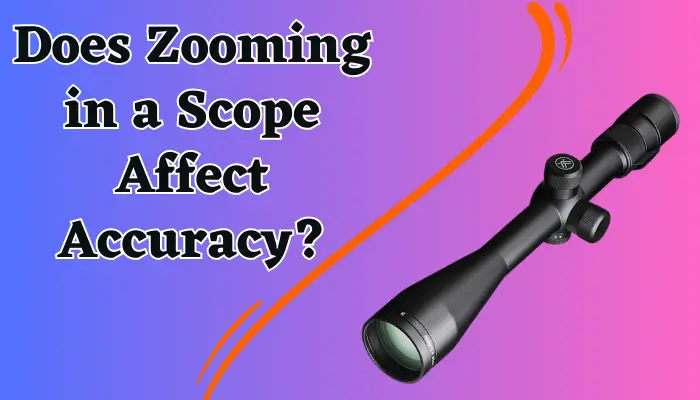This post may contain affiliate links which means I may receive a small commission for purchases made through the links. Learn More
Hunting is all about accuracy and slight mistake won’t help the cause and you will have to accept the ‘‘Clean Miss’’. When hunters miss the shot, they say the zooming or magnification power of the scope affected their aim and accuracy. Is it true?
Is it true? Does zooming in a scope affect the accuracy? Yes, zooming in with a scope at low magnification surely affects accuracy due to shifting focus points, resulting in a blurry effect and reduced aim accuracy. To avoid this, it is recommended to adjust the focus in accordance with the zooming power of the scope.
Keep in mind that this issue is not something that doesn’t have a solution. If you have basic knowledge of scopes, I am pretty much sure that you can avoid it. In this guide, I will explain everything.
Related Article: Where are Vortex Scopes Made?
What is Scope Zooming?
In this guide, my aim will be to give you all the information so I will start from the basics. I know you already know zooming of scopes, but those who are very knowledgeable about optics, especially scopes are a little confused. So, let me explain the basics.
Scope zooming is actually the ability of a scope to magnify the target image. The magnification power of a scope is expressed as a range of numbers. In more simple words, zooming is also called the magnification strength of scopes.
3-9x, where 3x is the lowest magnification and 9x is the highest magnification. The magnification power of a scope can be adjusted by rotating the magnification ring on the scope body. It is totally upto your personal choice and target distance. If your target is too far away, you can adjust the magnification ring accordingly.
How Does Scope Zooming Work?
When a shooter zooms in on a scope, they are adjusting the magnification of the image they see through the scope. Are you thinking about how the scope zooms in on the target?
When a shooter zooms in, actually he does move the lenses inside the scope to change the focal length of the light entering the scope. This is done by rotating the magnification ring. As a result, the image appears larger or smaller to the shooter.
Scopes use either a first focal plane (FFP) or a second focal plane (SFP) reticle. Reticle functionality is very important during the zooming of scope. Let me explain the difference between these two planes.
In an FFP scope, the reticle appears to change size as the shooter zooms in or out. This means that the holdover marks on the reticle remain accurate at any magnification. When you zoom in, the reticle also zooms in and its size gets bigger.
On the other hand, an SFP scope’s reticle stays the same size, regardless of the magnification level. No matter how much you zoom in with the scope, the reticle size, and position will remain the same.
So, when the user zoom in, the interior lenses moves inside the scope and the focal length gets changed. If you use the first focal plane (FFP), then the whole image size will increase along with the size of the reticle and you will see whole zoomed visuals. You will be able to target quite easily.
If you have Second Focal Plane, then on zooming, the reticle position and size won’t change, however, the overall image will get bigger which will allow you to shoot at a specific place of the buck with 100% accuracy. It would say that shot placement gets better when you have an SFP scope.
Related: Can You Use a Rifle Scope on a Shotgun?
Does Zooming of Scope always good?
Yes, to some extent zooming increases the accuracy of scopes. However, it is not always the case. If you’re a newbie, who doesn’t have much grip on holding the riffle, then the zooming of scope will cause more harm than good.
When you zoom in by using scope, then the target looks bigger and you tend to believe that you’ll be able to hit the target quite easily. But this is totally wrong unless you’re an expert or a professional shooter.
When you zoom in, your scope becomes too sensitive to the small movement of your hand. It is a fact that there are always small uncontrolled movements of the body that affect the aim when you zoom in. When you hold riffle with scope and zoom in and don’t have a grip on the riffle, then chances are high that you’ll miss the shot.
On the flip side, if you are an expert, and have some experience holding the riffle firmly, then the higher magnification or zooming of scope will help you in achieving the maximum accuracy as you’ll hold the riffle strong and it won’t get affected by movement.
Does Zooming in a Scope Affect Accuracy?
Before I explain the reason, let me answer the question. Yes, the zooming in a scope affects the accuracy and if you’re a newbie, chances are high that you’ll miss the shot convincingly due to lack of experience and grip.
One of the primary reasons why zooming in will affect the accuracy is the shift in the focal point. When a shooter adjusts the focus of the scope at low magnification and then zooms in, the focal point shifts which can cause a blurry image and affect accuracy. Due to blurriness, the target looks a bit ambiguous.
Keep in mind that if you zoom in with the scope, then your scope becomes too sensitive to small movement of hands, and if you move slightly then this movement will affect your view by making it unstable. Most newbies don’t have control of the riffle, so when they zoom in, the shakiness of their body and hands makes the visual unstable.
How can a person hit the target accurately if he is not actually seeing the stable visuals? When the image gets insatiable, the reticle also moves which ultimately affects the accuracy of scopes and leads you to an inaccurate shot or ‘‘Clean Miss’’.
When does zoom-in scope increase the accuracy? Zooming in the scope only helps those people who have control riffle and don’t move their body or hand when they have the riffle in their hands. Because there is no movement so the image remains stable, and the shooter hits the target perfectly and accurately. This never helps newbies.
However, if you’re a newbie and still love to zoom in, then I would highly recommend you to do the basic adjustments. If you plan to zoom in, you must take the time to adjust the parallax and focus on the target. This will surely help you in getting maximum accuracy.
Factors Affecting Accuracy
Although zooming is an important factor that affects either increases or decreases the accuracy of the shooting. However, it is not only one factor. There are many other things that can also affect your accuracy. In the section below, I will be explaining all of those factors. So, let’s get into it.
1- Distance to Target
The distance to the target is one of the most important factors affecting accuracy. The farther away the target is, the harder it is to hit. This is because the bullet has more time to be affected by external factors such as wind, gravity, and air resistance. To compensate for this, shooters need to adjust their aim accordingly and see the direction of wind, etc.
2- Wind Conditions
Wind conditions can have a significant impact on accuracy. Even a light breeze can cause a bullet to drift off course. As I said earlier, shooters need to take into account the direction and speed of the wind when aiming at a target.
If you’re shooting from a distance, make sure to look at the direction of the wind, follow the pattern, and hit accordingly by keeping in mind that the bullet will move slightly towards the direction of the wind.
3- Bullet Velocity and Weight
A heavier bullet will be less affected by wind and air resistance, but it will also have a slower velocity. A lighter bullet will have a higher velocity, but it will be more affected by external factors. Shooters need to choose the right bullet for the situation and adjust their aim accordingly. Your shot accuracy highly depends on the bullet if the weather conditions are bad or the wind is getting a bit aggressive.
Frequently Asked Questions
Magnification can affect accuracy in a few ways. At very high magnifications, even slight movements can cause the crosshairs to move off target. Also remember that the higher magnification can make it harder to keep the scope steady, which can also affect accuracy.
Yes, the type and quality quality of the scope can affect accuracy, as a low-quality scope usually have poor optics or lenses. The type of reticle and the location of the reticle can affect accuracy.

I’m a passionate outdoor activist who has got special love for optics. The school studies in optical mechanics and the travelling experience has made me an expert in optics like binoculars, scopes, and other devices. Stay connected with us for in-depth knowledge!

